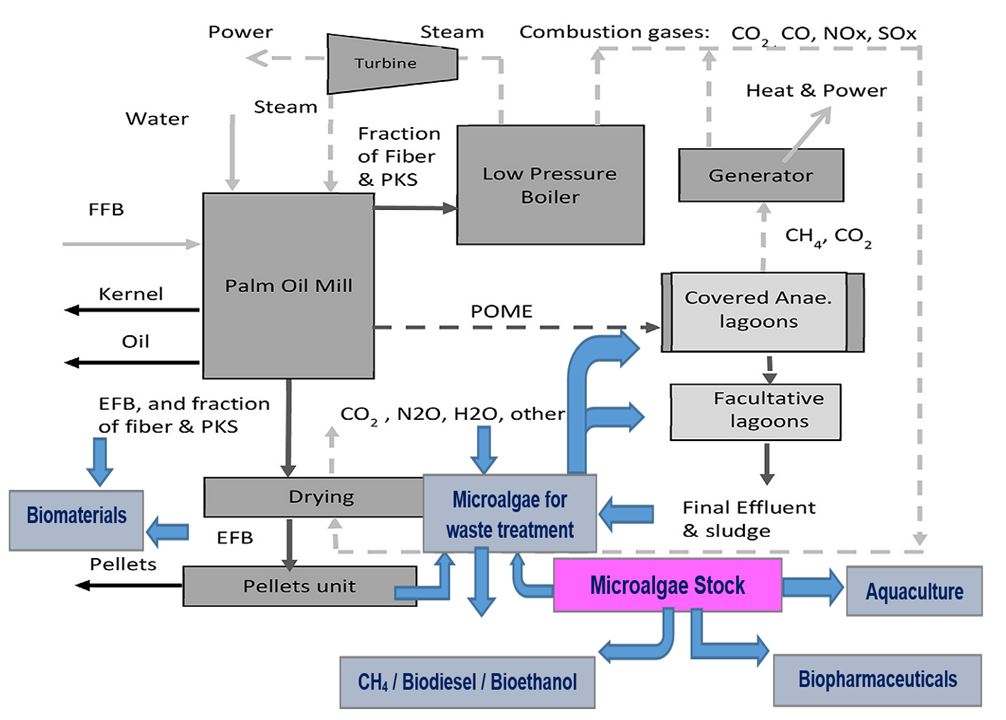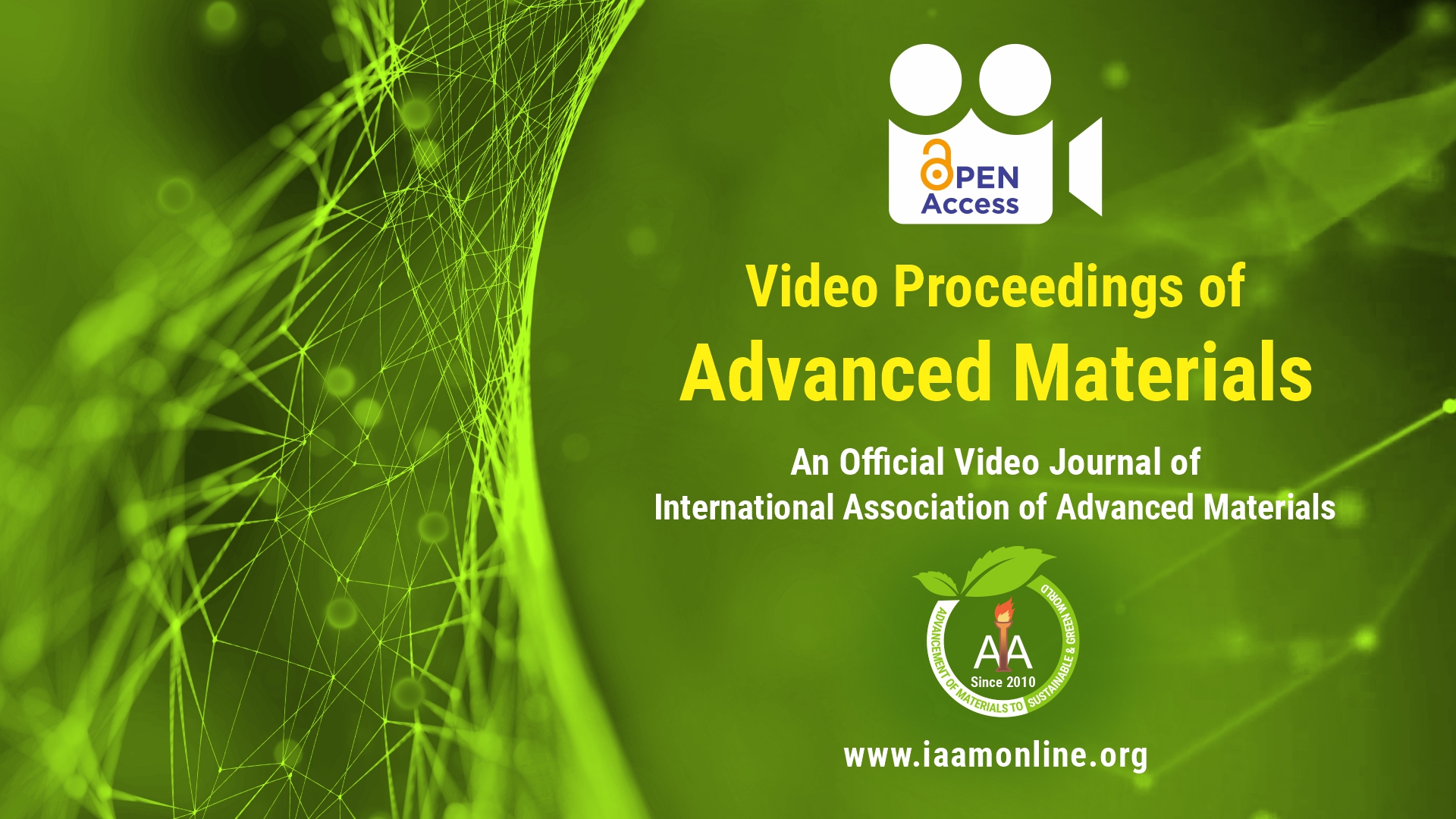Video Article Open Access
Meeting the Agenda of Global Sustainable Development: Integrated Algal Biorefinery and Palm Oil Milling as the Magic Bullets
Mohd Azmuddin Abdullah
Institute of Marine Biotechnology, Universiti Malaysia Terengganu, 21030 Kuala Nerus, Terengganu, Malaysia
Vid. Proc. Adv. Mater., Volume 2, Article ID 2021-02119 (2021)
DOI: 10.5185/vpoam.2021.02119
Publication Date (Web): 27 Mar 2021
Copyright © IAAM
Graphical Abstract

Abstract
Global Sustainable Development goals aim to achieve progress by approaching the Economics, Environment, and Socio-cultural diversity issues in a holistic manner, and not in a disintegrated, sectorial and I win-You lose, narrow basis. The major challenge is in bringing systems thinking and new paradigm such that the debate on climate change and the destruction of eco-systems and habitat for wildlife, is not divorced from the discussion and actions to tackle poverty and famine, and the emerging infectious diseases. The key performance indicators should revolve around resource optimization, biodiversity management and sustainable agro-practices, with 5 major outcomes – sufficient food production and distribution; cleaner energy, air, and water; affordable health care; minimization of emission, pollution, and wastage; strict monitoring, regulation, and enforcement mechanisms. The focus of this presentation is to highlight integrated algal biorefinery and palm oil milling processes as the magic bullets to achieve sustainable bioenergy production, environmental remediation and the production of high value added products and biopharmaceuticals. The image problem and the negative perception surrounding the oil palm industries with regards to the impact on the environment, and the efforts towards a more sustainable production route will be elaborated. This hopefully could bring forth insights to tackle the pressing problems facing the Planet and the People, whilst still reaping the Profit.
Keywords
Integrated biorefinery; biomass utilization; bioenergy; biomaterials; biopharmaceuticals.
Acknowledgement
The author thanks the Malaysian Ministry of Higher Education, Universiti Putra Malaysia, Universiti Teknologi PETRONAS, and Universiti Malaysia Terengganu, for the support throughout this long and arduous journey.
References
- M. A. Abdullah, H. A. Hussein, IOP Conference Series: Earth and Environmental Science, 2020, 463, 012084.
- J. A. G. Nunez, N. E. R. Contreras, D. T. Rodriguez, E. S. Lora, C. S. Frear, C. Stockle, M. G. Perez, Resources, Conservation and Recycling, 2016, 110, 99-114.
- M. A. Abdullah, M. S. Nazir, M. R. Raza, B. A. Wahjoedi, A. W. Yussof, Journal of Cleaner Production, 2016, 126, 686-97.
- H. Ajab, A. A. A. Khan, M. S. Nazir, A. Yaqub, M. A. Abdullah, Environmental Research, 2019, 176, 108563.
- H. A. Hussein, H. Mohamad, M. M. Ghazaly, Laith A.A., M. A. Abdullah, Journal of Applied Phycology, 2020, 32, 127-143.
Biography
Mohd Azmuddin Abdullah obtained an M. Eng in Chemical Engineering and Biotechnology (1994) from the University of Manchester Institute of Science and Technology (UMIST), United Kingdom, and a PhD in Bioprocess Engineering (1999) from Universiti Putra Malaysia (UPM). He was a Visiting Scientist (1997) in the Laboratory of Plant Physiology, Kinki University, Japan, and a Post-Doctoral Fellow (2000-2001) in the Biomaterials Science and Engineering Laboratory, Massachusetts Institute of Technology (MIT), USA. He has been a Researcher/an Academic in the Department of Biotechnology, Universiti Putra Malaysia (1994-2004), and Department of Chemical Engineering, Universiti Teknologi PETRONAS (2004-2014). Since 2015, he is an Associate Professor in the Institute of Marine Biotechnology, Universiti Malaysia Terengganu (UMT). He has authored/co-authored 170 articles and filed 6 Malaysian patents, and 3 trademarks, on bioenergy, bioproducts and biopharmaceuticals. In 2015, he was awarded the Teaching Excellence Award for “Health, Safety and Environment as the basis for innovative T, R, D, C & E on Sustainability” by the Association for the Advancement of Biodiversity Science (AABS), India, and in 2017, the Scientist Medal by the International Association of Advanced Materials (IAAM), at the European Advanced Material Congress, Sweden.
Video Proceedings of Advanced Materials

Upcoming Congress



